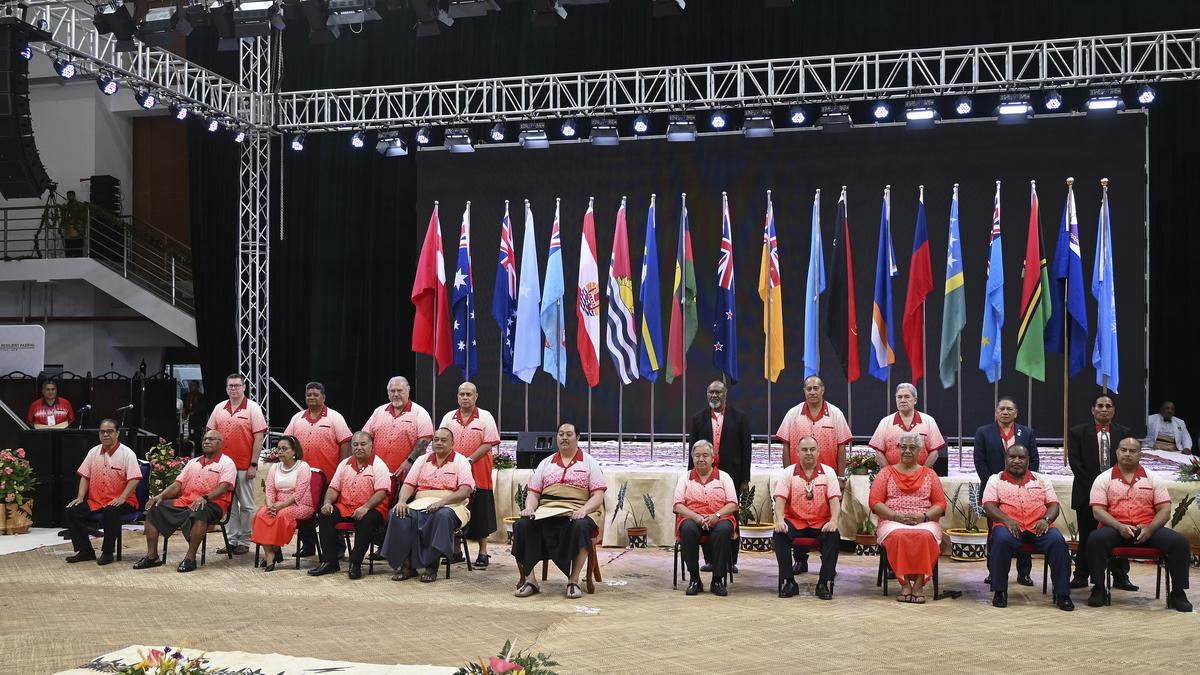Leaders pose for a photo during the Pacific Islands Forum leaders meeting in Nuku’alofa, Tonga, on Monday, August 26, 2024. File | Photo credit: AP
Pacific leaders on Friday backed a major joint policing initiative and rejected attempts by China’s allies to sideline Taiwan as they wrapped up a regional summit in Tonga.
Security was a focal point at this year’s Pacific Islands Forum, a logjam of U.S. partners, Chinese friends and states still allied with Taiwan.
US ally Australia convinced its Pacific neighbors to back a landmark plan that would give the country a bigger role in training police in the region.
The plan would create up to four regional police training centers and a multinational crisis response force, backed by $271 million in initial funding from Australia.

While it was hailed as a “gift from heaven” by countries such as the Fiji Islands, others closer to Beijing took a cooler view.
“The only thing we don’t agree with is that it imposes conditions on our own internal security,” Solomon Islands Foreign Minister Peter Agovaka said on Friday.
Taiwan remains
Critics suggested the deal was less about police and more about carving up the region to keep China on the margins.
Such concerns were sparked when Australian Prime Minister Anthony Albanese was caught joking with a top US diplomat about him going “half-way” on costs.
The forum’s closing statement endorsed the policing plan, but noted that some members may need to conduct their own “national consultation” first.
China’s closest friend in the Pacific, the Solomon Islands, has also been agitating behind closed doors all week to effectively oust Taiwan as a development partner, ending three decades of participation.
Solomon Islands Foreign Minister Agovaka said the forum was for “sovereign states” and “not for states under any other jurisdiction.”
The final declaration blocked that idea and instead reaffirmed a 1992 agreement that paved the way for Taiwan’s participation.
China’s special envoy to the Pacific Islands, Qian Bo, reacted with disbelief to the statement.
“It must be a mistake. It must be a mistake. You know, this is certainly not the consensus,” he told reporters at the summit.
“This should not be the final communiqué, there must be a correction to the text.”
The South Pacific was once seen as a bastion of support for Taiwan’s claim for statehood, but China has systematically chipped away at this.
Over the past five years, Solomon Islands, Kiribati and Nauru have all been convinced to switch to recognizing Beijing instead of Taipei.
Beijing is urging its diplomatic allies to withdraw recognition of the self-ruled island.
Palau, the Marshall Islands and Tuvalu maintain diplomatic relations with Taipei, but are under constant pressure to change.
The US territories of Guam and American Samoa were elevated to associate members of the forum, also against the wishes of the Solomon Islands.
Climate cash
Speaking at the forum this week, United Nations chief Antonio Guterres threw his support behind the Pacific’s renewed efforts to boost climate finance.
His climate call to arms has been reinforced by a new report showing that the Pacific’s coral atolls and low-lying islands are disproportionately threatened by rising sea levels.
Tongan Prime Minister Siaosi Sovaleni, who hosted the summit, said Pacific countries had decided to organize a “global donor event” this year to raise money for a climate fund.
With a new headquarters in Tonga, the fund is currently well short of its $500 million target.
Although not on any official agenda, the push for deep-sea mining also sparked heated debate.
A company backed by the Pacific microstate of Nauru told AFP it planned to scale up ocean mining operations as early as 2026.
Other forum members, such as Palau, have called for a moratorium, saying lingering questions about environmental damage need to be addressed.
French press
Friday’s forum pledged to hold an official ‘talanoa’ – or dialogue – on the divisive topic this year.
Pacific leaders scored a small victory in the New Caledonia issue, where proposed electoral reforms sparked deadly unrest this year.
A Pacific delegation is expected to soon embark on a fact-finding mission to the French territory, the date of which has yet to be determined.
The French government was repeatedly reprimanded during the forum for its handling of the ongoing crisis.
“We have seen a lot of nice press about the French delegation this week,” said French Ambassador Veronique Roger-Lacan.





















